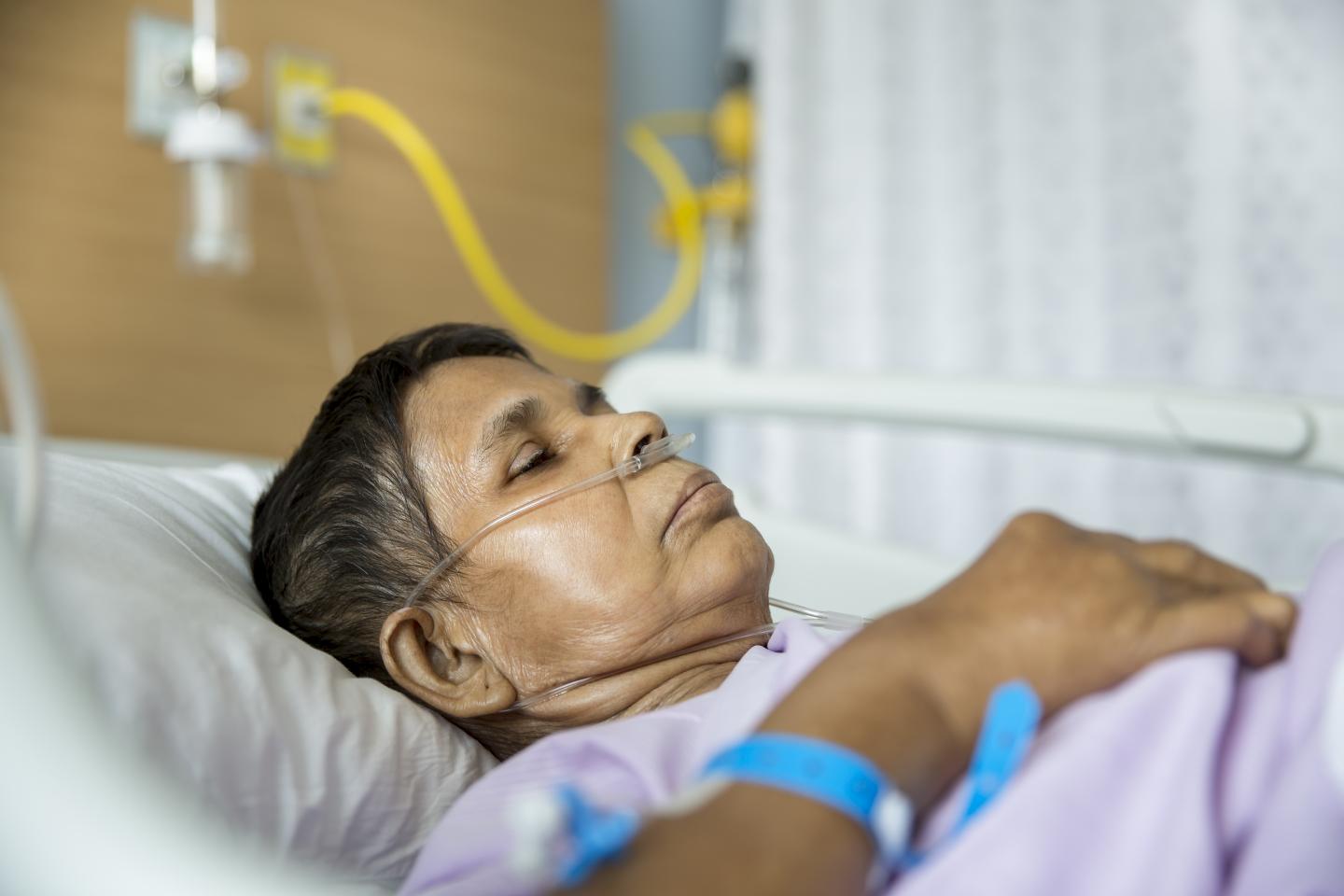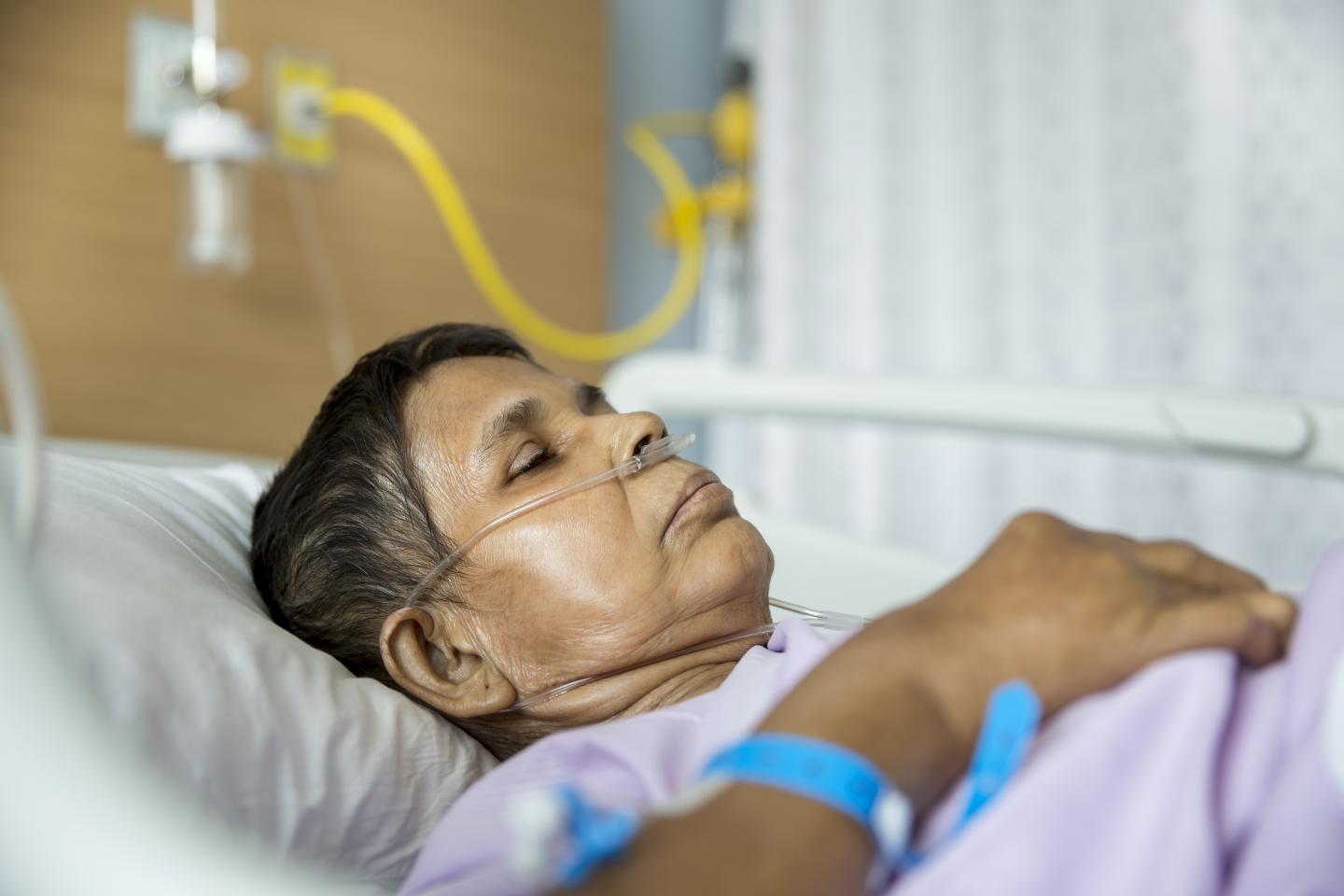
Credit: ATS
July 20, 2018–Supplemental oxygen eliminates the rise in morning blood pressure experienced by obstructive sleep apnea (OSA) patients who stop using continuous positive airway pressure (CPAP), the standard treatment for OSA, according to new research published online in the American Thoracic Society's American Journal of Respiratory and Critical Care Medicine.
In "Effect of Supplemental Oxygen on Blood Pressure in OSA: A Randomized, CPAP Withdrawal Trial," Chris D. Turnbull, BMBCh, a physician at the Oxford Centre for Respiratory Medicine at Churchill Hospital Oxford in the U.K., and co-authors report that in patients with moderate to severe OSA, supplemental oxygen prevented the rise in systolic and diastolic blood pressure, and the increase in oxygen desaturations that were seen in the control arm of the study after CPAP was withdrawn.
Twenty-five adults living in the United Kingdom participated in the study. All had been using CPAP successfully for over a year. CPAP was withdrawn for 14 nights, during which time participants first received supplemental oxygen or regular air overnight through a face mask or nasal cannula, and then crossed over to a second CPAP withdrawal period with the opposite treatment. Neither the researchers nor the participants knew when the participant was receiving the intervention (oxygen) or control (air) therapy.
Many studies have demonstrated an association between OSA, hypertension and cardiovascular disease. Some of these studies have linked the acute rises in blood pressure that OSA patients experience while sleeping to the constant need to wake up when their breathing stops or is partially blocked.
The authors of the current study wanted to find out if these recurrent arousals were also responsible for higher blood pressure in OSA patients during the day or whether intermittent hypoxia (low oxygen levels), resulting from interrupted breathing during sleep, caused a rise in blood pressure during the day.
The study found that supplemental oxygen substantially reduced intermittent hypoxia, but had minimal effect on two markers of arousal: the apnea-hypopnea index, a measure of sleep apnea severity that takes into account episodes of paused and shallow breathing, and the heart rate rises index. Based on these findings, the authors wrote that "intermittent hypoxia appears to be the dominant cause of daytime increase in blood pressure in OSA."
Dr. Turnbull said, "This is important because many patients, especially those with few symptoms, are unable to tolerate using CPAP treatment and other treatments may be needed for these individuals," given that elevated levels of blood pressure put them at greater risk for heart attack and stroke.
However, before supplemental oxygen can be used as an alternative to CPAP, the authors write that more research must be done to prove it is safe. Other studies, they note, have shown that supplemental oxygen could increase injury to the heart when administered after a heart attack, and that in some patients, supplemental oxygen causes hypercapnia (excessive carbon dioxide in the bloodstream).
"The next challenge for researchers will be to see if supplemental oxygen treatment has similar effects in patients in the longer-term along with assessing its longer-term safety," Dr. Turnbull said.
The study also looked at objective and subjective measures of daytime sleepiness but did not find a difference between the two groups.
###
Share via Twitter
"Study find overnight supplemental oxygen reduces daytime blood pressure rise in #OSA patients who quit using #CPAP, suggesting potential new therapy for treating #sleep apnea."
Follow Us
ATS – @atscommunity
AJRCCM – @ATSBlueEditor
About the American Journal of Respiratory and Critical Care Medicine (AJRCCM):
The AJRCCM is a peer-reviewed journal published by the American Thoracic Society. The Journal takes pride in publishing the most innovative science and the highest quality reviews, practice guidelines and statements in pulmonary, critical care and sleep medicine. With an impact factor of 12.996, it is the highest ranked journal in pulmonology. Editor: Jadwiga Wedzicha, MD, professor of respiratory medicine at the National Heart and Lung Institute (Royal Brompton Campus), Imperial College London, UK.
About the American Thoracic Society:
Founded in 1905, the American Thoracic Society is the world's leading medical association dedicated to advancing pulmonary, critical care and sleep medicine. The Society's more than 16,000 members prevent and fight respiratory disease around the globe through research, education, patient care and advocacy. The ATS publishes three journals, the American Journal of Respiratory and Critical Care Medicine, the American Journal of Respiratory Cell and Molecular Biology and the Annals of the American Thoracic Society.
The ATS will hold its 2019 International Conference, May 17-22, in Dallas, Texas, where world-renowned experts will share the latest scientific research and clinical advances in pulmonary, critical care and sleep medicine.
Media Contact
Dacia Morris
[email protected]
212-315-8620
@atscommunity
http://www.thoracic.org





